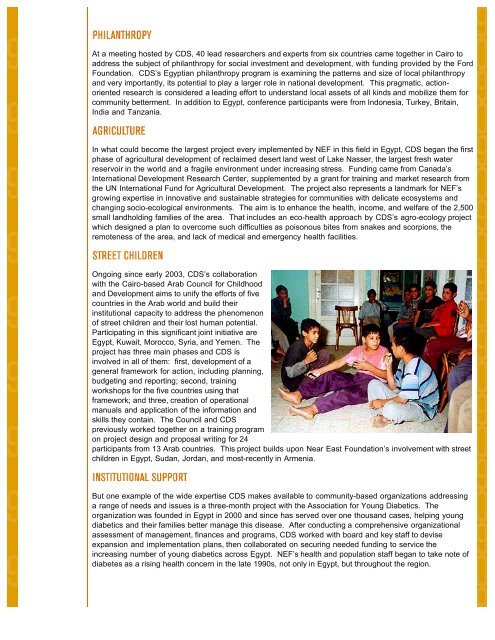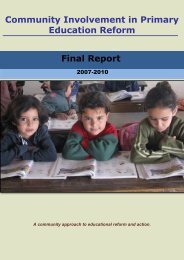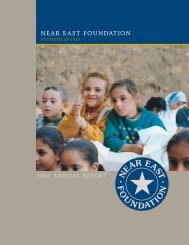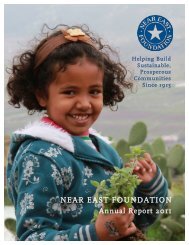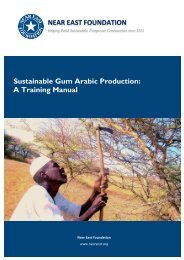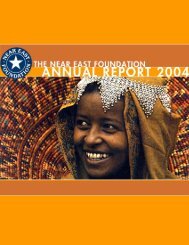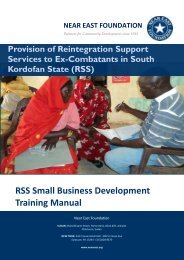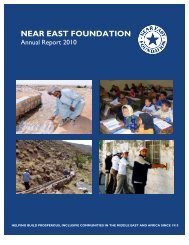NEF 2005 Annual Report - Near East Foundation
NEF 2005 Annual Report - Near East Foundation
NEF 2005 Annual Report - Near East Foundation
You also want an ePaper? Increase the reach of your titles
YUMPU automatically turns print PDFs into web optimized ePapers that Google loves.
At a meeting hosted by CDS, 40 lead researchers and experts from six countries came together in Cairo to<br />
address the subject of philanthropy for social investment and development, with funding provided by the Ford<br />
<strong>Foundation</strong>. CDS’s Egyptian philanthropy program is examining the patterns and size of local philanthropy<br />
and very importantly, its potential to play a larger role in national development. This pragmatic, actionoriented<br />
research is considered a leading effort to understand local assets of all kinds and mobilize them for<br />
community betterment. In addition to Egypt, conference participants were from Indonesia, Turkey, Britain,<br />
India and Tanzania.<br />
In what could become the largest project every implemented by <strong>NEF</strong> in this field in Egypt, CDS began the first<br />
phase of agricultural development of reclaimed desert land west of Lake Nasser, the largest fresh water<br />
reservoir in the world and a fragile environment under increasing stress. Funding came from Canada’s<br />
International Development Research Center, supplemented by a grant for training and market research from<br />
the UN International Fund for Agricultural Development. The project also represents a landmark for <strong>NEF</strong>’s<br />
growing expertise in innovative and sustainable strategies for communities with delicate ecosystems and<br />
changing socio-ecological environments. The aim is to enhance the health, income, and welfare of the 2,500<br />
small landholding families of the area. That includes an eco-health approach by CDS’s agro-ecology project<br />
which designed a plan to overcome such difficulties as poisonous bites from snakes and scorpions, the<br />
remoteness of the area, and lack of medical and emergency health facilities.<br />
Ongoing since early 2003, CDS’s collaboration<br />
with the Cairo-based Arab Council for Childhood<br />
and Development aims to unify the efforts of five<br />
countries in the Arab world and build their<br />
institutional capacity to address the phenomenon<br />
of street children and their lost human potential.<br />
Participating in this significant joint initiative are<br />
Egypt, Kuwait, Morocco, Syria, and Yemen. The<br />
project has three main phases and CDS is<br />
involved in all of them: first, development of a<br />
general framework for action, including planning,<br />
budgeting and reporting; second, training<br />
workshops for the five countries using that<br />
framework; and three, creation of operational<br />
manuals and application of the information and<br />
skills they contain. The Council and CDS<br />
previously worked together on a training program<br />
on project design and proposal writing for 24<br />
participants from 13 Arab countries. This project builds upon <strong>Near</strong> <strong>East</strong> <strong>Foundation</strong>’s involvement with street<br />
children in Egypt, Sudan, Jordan, and most-recently in Armenia.<br />
But one example of the wide expertise CDS makes available to community-based organizations addressing<br />
a range of needs and issues is a three-month project with the Association for Young Diabetics. The<br />
organization was founded in Egypt in 2000 and since has served over one thousand cases, helping young<br />
diabetics and their families better manage this disease. After conducting a comprehensive organizational<br />
assessment of management, finances and programs, CDS worked with board and key staff to devise<br />
expansion and implementation plans, then collaborated on securing needed funding to service the<br />
increasing number of young diabetics across Egypt. <strong>NEF</strong>’s health and population staff began to take note of<br />
diabetes as a rising health concern in the late 1990s, not only in Egypt, but throughout the region.


